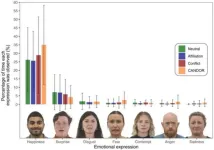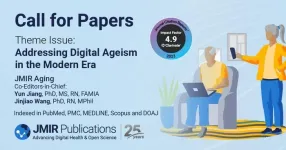(Press-News.org) PITTSBURGH, June 13, 2024 – New University of Pittsburgh research points to a potential approach to reducing the risk of diabetes associated with widely prescribed antipsychotic medications.
The study presents early evidence in support of co-administering antipsychotic medications that block dopamine receptors in the brain alongside drugs that stop antipsychotics from blocking those same receptors in the pancreas. This approach, published today in Diabetes, could limit metabolic side effects, including impaired control over blood sugar, or dysglycemia.
This research may also explain why weight control medications, including new neuropeptide drugs Wegovy and Ozempic, may not be as effective as hoped in controlling dysglycemia caused by antipsychotic drugs. Patients who are experiencing the weight gain associated with antipsychotic medications might be tempted to take these new drugs to control satiety – but they may miss an important underlying cause of the drug-induced deglycation.
“Antipsychotic medications don’t just stop working below the neck,” said senior author Zachary Freyberg, M.D., Ph.D., associate professor of psychiatry and cell biology at Pitt’s School of Medicine. “Maintaining glucose metabolism requires the brain to be in constant communication with the rest of the body, and vice versa. Next-generation antipsychotic drugs can be modified as a new strategy to control dysglycemia and diabetes.”
Most prescription antipsychotic medications work by blocking the class of brain receptors that respond to a neurotransmitter called dopamine – a cornerstone molecule of the brain’s reward system and brain-directed movement control. However, the subtype of dopamine receptors that respond to antipsychotic medications, called dopamine D2 receptors, are not exclusive to the brain. As Freyberg’s earlier research has shown, antipsychotic medications also block D2 receptors in the pancreas.
Freyberg’s dogma-breaking discovery highlighted that pancreatic dopamine plays a key role in controlling blood sugar by interacting with D2 receptors on the surface of pancreatic cells that control production and secretion of hormones insulin and glucagon. When the fragile balance between glucose-raising and -lowering hormones is destabilized by antipsychotic medications, dysglycemia and diabetes may follow.
However, peripheral dopamine signaling can be harnessed for therapeutic good. In collaboration with researchers at the National Institutes of Health’s National Institute on Drug Abuse (NIH NIDA), the team created a molecule that can limit antipsychotic drugs from blocking D2 receptors in organs like the pancreas, but not in the brain. This molecule, called bromocriptine methiodide, or BrMel, is structurally similar to bromocriptine – an FDA-approved drug to treat type 2 diabetes – but has a modification that makes it less likely to pass through the brain-blood barrier if administered systemically, therefore limiting its activity to the periphery.
Early studies in mice suggest that dopamine’s effects on glucose metabolism require communication between the brain and the peripheral organs including the pancreas. Experiments have shown that, unlike systemically administered bromocriptine that improves the glucose profile of insulin-resistant mice, peripherally-limited BrMeI, or bromocriptine delivered directly to the brain, failed to show improvements. Drugs like BrMeI that can stop antipsychotic medications from acting on peripheral targets may therefore be useful in preventing, or even reversing, dysglycemia.
Freyberg and his collaborators at Pitt are in the early stages of a safety clinical trial to ensure that the therapeutic effects of antipsychotic drugs are preserved when these psychiatric medications are administered in tandem with bromocriptine since it is already FDA approved. They hope to launch a bigger trial to test the efficacy of BrMel and similar molecules for limiting dysglycemia in the next several years.
“The fact that both the brain and the body are required to maintain stable glycemic control provides a novel dimension in understanding neuropsychiatry and begins to integrate disparate pieces of knowledge about different organ systems into a coherent whole,” said Freyberg.
“The majority of psychiatric medications are prescribed by general practitioners and not psychiatrists,” he added. “We hope that our research builds awareness about the importance of communication between the brain and the rest of the body in maintaining physiological functions and reminds clinicians that they should also consider that drugs designed to act on targets in the brain, like psychiatric medications, may also have significant actions outside of the brain when making prescription recommendations.”
Other authors of this research are Zachary Farino, M.S., Despoina Aslanoglou, Ph.D., and José Mantilla-Rivas, M.D., all of Pitt; Alessandro Bonifazi, Ph.D., Michael Ellenberger, J.D., Comfort Boateng, Ph.D., and Amy Hauck Newman, Ph.D., all of NIDA; Rana Rais, Ph.D., and Barbara Slusher, Ph.D., both of Johns Hopkins University; Sandra Pereira, Ph.D., and Margaret Hahn, M.D., Ph.D., both of the University of Toronto; Amy Eshleman, Ph.D., and Aaron Janowsky, Ph.D., both of the Oregon Health & Science University; and Gary Schwartz, Ph.D., of Albert Einstein College of Medicine. The content is solely the responsibility of the authors and does not necessarily represent the official views of the National Institutes of Health.
END
Antipsychotic medications don’t just stop working below the neck
Study hints at tools to prevent diabetes caused by psychiatric meds
2024-06-13
ELSE PRESS RELEASES FROM THIS DATE:
New study: Outdoor recreation noise affects wildlife behavior and habitat use
2024-06-13
FORT COLLINS, Colo., June 13, 2024 — We may go to the woods seeking peace and quiet, but are we taking our noise with us? A recent study published in the journal, Current Biology, led by scientists from the USDA Forest Service Rocky Mountain Research Station indicates that the answer is yes—and that this noise can trigger a fear response, as if escaping from predators. This new science calls into question whether otherwise high-quality habitat truly provides refugia for wildlife when recreationists are present and underscores the challenges land managers face in balancing ...
Confronting trauma alleviates chronic pain among older veterans
2024-06-13
A new study led by UCLA Health and the U.S. Veterans Affairs Office found chronic pain among older adults could be significantly reduced through a newly developed psychotherapy that works by confronting past trauma and stress-related emotions that can exacerbate pain symptoms.
Published in JAMA Network Open on June 13, the study compared the newer therapy, known as emotional awareness and expression therapy, or EAET, to traditional cognitive behavioral therapy, or CBT, in treating chronic pain as well as mental health symptoms such as depression, anxiety and post-traumatic stress disorder symptoms among older veterans.
The ...
Pediatric RSV hospitalizations and respiratory support after the pandemic
2024-06-13
About The Study: This cross-sectional study identified a post-pandemic pediatric respiratory syncytial virus (RSV) surge that resulted in markedly increased hospital volumes and advanced respiratory support needs in older children with fewer comorbidities than pre-pandemic seasons. These clinical trends may inform novel vaccine allocation to reduce the overall burden during future RSV seasons.
Corresponding Author: To contact the corresponding authors, email Zachary A. Winthrop, M.D. (zachary.winthrop@childrens.harvard.edu), and Melody G. Duvall, M.D., Ph.D. (melody.duvall@childrens.harvard.edu).
To ...
Association between cost sharing and naloxone prescription dispensing
2024-06-13
About The Study: The elimination of cost sharing might be associated with increased naloxone dispensing to commercially insured and Medicare patients.
Corresponding Author: To contact the corresponding author, Kao-Ping Chua, M.D., Ph.D., email chuak@med.umich.edu.
To access the embargoed study: Visit our For The Media website at this link https://media.jamanetwork.com/
(doi:10.1001/jama.2024.8378)
Editor’s Note: Please see the article for additional information, including other authors, author contributions and affiliations, conflict of interest and financial disclosures, and funding and support.
Embed this link ...
Giant Magellan Telescope enclosure ready for construction
2024-06-13
PASADENA, CA – June 13, 2024 – The Giant Magellan Telescope and IDOM today announced that the telescope’s enclosure, set to be one of the world’s largest astronomical facilities, passed its final design review and is now ready for construction in Chile. The review marks a major milestone for the telescope, which is now 40% under construction and on track to be operational by the early 2030s.
“A team of ten international subject matter experts validated two years of design work by IDOM and the Giant Magellan Telescope. The final design of the enclosure is unique and an important feat of technical management, design, and engineering. We are very grateful ...
More hospitals than ever require staff to get flu shots
2024-06-13
In just a few months, hospitals and health systems nationwide will start working to vaccinate as many staff as possible against the flu. And a new study suggests that more of those hospitals than ever before will require employees to get vaccinated, or seek an exemption.
That means more patients could avoid catching the flu while receiving health care -- a key goal for improving patient safety.
In all, the new study shows that 96% of the hospitals that serve America’s veterans, and ...
Facially expressive people shown to be more likeable and socially successful
2024-06-13
Analysis of more than 1,500 natural conversations suggests that humans may have evolved more complex facial muscle movements to help us bond with each other.
In the first part of the study, researchers posed as participants in semi-structured video calls with 52 people to record natural reactions and expressions during various everyday scenarios.
The conversations were designed to involve a range of behaviours, including listening, humour, embarrassment, and conflict. To test ability to inhibit facial expression, participants were also asked to keep a still face while their partner tried to make them move.
The same individuals ...
Antarctica's strongest ice melt phases of the past as a gauge of the coming sea level rise
2024-06-13
Of all the polar regions, the West Antarctic Ice Sheet is the most sensitive to a warming ocean due to climate change. This is already causing a long-term ice sheet melt, and the question is how fast that melting process will take place. It may be that this enormous mass of ice already passed the tipping point, with irreversibly fast melting. This has the potential to sharply accelerate sea level rise in the near future, but the processes causing this are not yet well understood. That is why paleoclimatologists from the Faculty ...
JMIR Aging announces new theme issue on digital ageism
2024-06-13
(Toronto, June 13, 2024) JMIR Publications invites submissions to a new theme issue titled “Addressing Digital Ageism in the Modern Era” in its premier open access journal JMIR Aging, indexed in PubMed, SCOPUS, Web of Science, and DOAJ. The theme for this call was selected by the journal’s diverse audiences through a social media poll.
While digital technologies offer immense opportunities for societal progress and individual empowerment, they also bring forth new challenges, such as digital ageism. Digital ageism is discrimination against individuals based on their age within the context ...
Photonic chip integrates sensing and computing for ultrafast machine vision
2024-06-13
WASHINGTON — Researchers have demonstrated a new intelligent photonic sensing-computing chip that can process, transmit and reconstruct images of a scene within nanoseconds. This advance opens the door to extremely high-speed image processing that could benefit edge intelligence for machine vision applications such as autonomous driving, industrial inspection and robotic vision.
Edge computing, which performs intensive computing tasks like image processing and analysis on local devices, is evolving into edge intelligence by adding artificial intelligence (AI) driven analysis and decision-making.
“Capturing, processing and analyzing images ...
LAST 30 PRESS RELEASES:
A promising potential therapeutic strategy for Rett syndrome
How time changes impact public sentiment in the U.S.
Analysis of charred food in pot reveals that prehistoric Europeans had surprisingly complex cuisines
As a whole, LGB+ workers in the NHS do not experience pay gaps compared to their heterosexual colleagues
How cocaine rewires the brain to drive relapse
Mosquito monitoring through sound - implications for AI species recognition
UCLA researchers engineer CAR-T cells to target hard-to-treat solid tumors
New study reveals asynchronous land–ocean responses to ancient ocean anoxia
Ctenophore research points to earlier origins of brain-like structures
Tibet ASγ experiment sheds new light on cosmic rays acceleration and propagation in Milky Way
AI-based liquid biopsy may detect liver fibrosis, cirrhosis and chronic disease signals
Hope for Rett syndrome: New research may unlock treatment pathway for rare disorder with no cure
How some skills become second nature
SFU study sheds light on clotting risks for female astronauts
UC Irvine chemists shed light on how age-related cataracts may begin
Machine learning reveals Raman signatures of liquid-like ion conduction in solid electrolytes
Children’s Hospital of Philadelphia researchers emphasize benefits and risks of generative AI at different stages of childhood development
Why conversation is more like a dance than an exchange of words
With Evo 2, AI can model and design the genetic code for all domains of life
Discovery of why only some early tumors survive could help catch and treat cancer at very earliest stages
Study reveals how gut bacteria and diet can reprogram fat to burn more energy
Mayo Clinic researchers link Parkinson's-related protein to faster Alzheimer's progression in women
Trends in metabolic and bariatric surgery use during the GLP-1 receptor agonist era
Loneliness, anxiety symptoms, depressive symptoms, and suicidal ideation in the all of us dataset
A decision-support system to personalize antidepressant treatment in major depressive disorder
Thunderstorms don’t just appear out of thin air - scientists' key finding to improve forecasting
Automated CT scan analysis could fast-track clinical assessments
New UNC Charlotte study reveals how just three molecules can launch gene-silencing condensates, organizing the epigenome and controlling stem cell differentiation
Oldest known bony fish fossils uncover early vertebrate evolution
High‑performance all‑solid‑state magnesium-air rechargeable battery enabled by metal-free nanoporous graphene
[Press-News.org] Antipsychotic medications don’t just stop working below the neckStudy hints at tools to prevent diabetes caused by psychiatric meds







